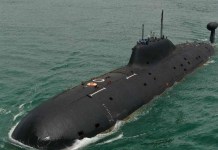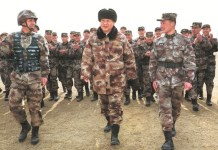Pakistan is one of the few countries and the only Islamic nation in the world to possess nuclear weapons. Pakistan’s nuclear weapons are designed to offset India’s huge superiority in conventional forces and deter the adversaries, writes the National Interest.
Trump Offers To Mediate On Kashmir Dispute and Repair India and Pakistan Relations
Pakistan began developing nuclear weapons after its arch-rival India detonated its first nuclear bomb in 1974. A conservative estimate puts Pakistan’s nuclear arsenal around 150 to 180 bombs. In 1998 Pakistan in response to India’s second nuclear test detonated five devices in a single day and a sixth one two days later.
To tackle growing Indian threats of punitive cross border strikes, Pakistan focussed on developing tactical nuclear weapons. Tactical nuclear weapons or non-strategic nuclear weapons that have a low yield. These weapons unlike large nuclear weapons that are used for destroying large strategic or civilian targets in the enemy’s territory are used for destroying military targets on the battlefield.
Pakistan’s economy is tiny when compared against India and as such it does not have a defense budget to counter India’s vastly superior armed forces with the gulf widening every day. In an all-out ground war, India undoubtedly holds the edge.
Daniel Pearl Murder Case: Pakistan Overturns Convicted Man’s Death Sentence
India had envisioned launching a counterattack with three Strike Corps of three divisions, all highly mechanized and each including at least one armored division in case of a Pakistani offensive. However, Pakistani Tactical Nuclear Weapons are meant to thwart India’s counterattack in case of a failed Pakistani offensive to halt the advancing Indian troops dead in their tracks.
The idea for having tactical nuclear weapons most probably had its origins in the 1999 Kargil War. After Pakistani forces occupied much of the Indian Territory, the Indian Army mounted an offensive to remove the Pakistani force and regain the lost ground.
Domestic Stocks Plunge While India Generously Exporting Anti-Covid-19 Drugs; Should You Worry?
Although India was at a disadvantageous position it still managed to win the war and this loss made Pakistan aware of India’s conventional superiority and the need to have tactical nuclear weapons. Another reason Pakistan wanted to have tactical nuclear weapons was to thwart India’s cold start doctrine, as widely publicized by former Indian National Security Advisor – Ajit Doval
It became clear that according to a report by Bulletin of Atomic Scientist Pakistan has around 20 -30 transporter-erector-launcher vehicles meant to carry its NASR/HATF short-range tactical nuclear ballistic missiles. Each vehicle can carry two or more NASR missiles.
Egypt & Pakistan: Global Response to Coronavirus Exposes Governments’ Fault Lines: OpEd
These missiles are believed to have a range of 43 miles meaning they are more likely to be used for defensive rather than offensive purposes. This also indicates that the nuclear weapons would have a low yield as Pakistan would not want to have its own nuclear weapons with a huge yield detonated on its territory.
However, these weapons should worry Pakistanis more than anyone else. Even if Pakistan calls it tiny weapons to offset India’s conventional military might, these are nonetheless nuclear weapons and if used against India will not only invite an unimaginable response from New Delhi but also global condemnation and sanctions from across the world.
Analysts believe that Pakistan would have to use a minimum of 30 kiloton bomb to seriously hurt Indian troops. The wind direction is crucial at the time of detonation. The radioactive particles from a detonation can spread to thousands of miles. Any such detonation on the Pakistani soil and near to a city can kill millions of Pakistanis.
Pakistan Air Force Deploying JF-17 Jets Near Ladakh Border – Reports
Additionally, a big problem that has struck the Pakistani political and military establishment is regarding the control of such weapons. A political decision may take too much time rendering the use of tactical nuclear weapons futile.
However, the Pakistan Army to avoid such delay has tasked area commanders with the responsibility of using the tactical warheads which has presented another serious question. If an area commander uses these weapons then there may be no turning back as India then would be forced counter-nuke Pakistan. This has exacerbated the command and control challenges.
Pakistan Quotes Religious Textbooks For Not Airlifting Stranded Students From China
One of the biggest threats to these Pakistani weapons is from the home and foreign-based insurgents. India and other global powers are especially worried about the nature of security accorded to such tactical weapons and their control system.
Some officials are worried that these weapons may be snatched while they are being transported. Another worry is that the terror groups may be able to plant one of their own sympathizers or they may turn an insider to sympathize with the terrorist cause who in turn may hand them secrets of nuclear technology.
Considering that such weapons present multiple problems from their effective control to protection and to its possible use on Pakistani soil itself and that too without any conclusive evidence of it being a deterrent, the tactical nuclear weapons are more a nightmare than a strategic deterrent.
Originally Penned By: Kyle Mizokami, Edited By Nitin J Ticku.
VIEWS PERSONEL




